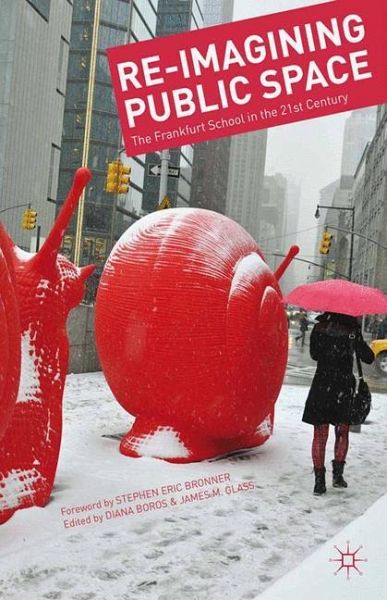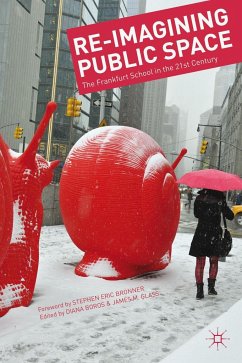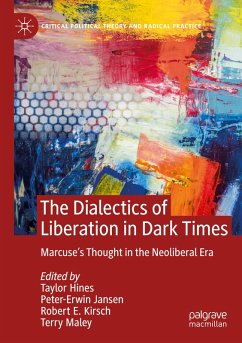
Broschiertes Buch
Re-Imagining Public Space
The Frankfurt School in the 21st Century
Herausgegeben: Boros, D.; Glass, J.
Versandkostenfrei!
Versandfertig in 6-10 Tagen

PAYBACK Punkte
19 °P sammeln!





Public space, both literally and figuratively, is foundationally important to political life. From Socratic lectures in the public forum, to Occupy Wall Street and the Arab Spring, public spaces have long played host to political discussion and protest. The book provides a direct assessment of the role that public space plays in political life.
James M. Glass, University of Maryland, USA Diana Boros, St. Mary's College of Maryland, USA Douglas Kellner, University of California, Los Angeles, USA C. Fred Alford, University of Maryland, College Park, USA Mary Caputi, California State University, Long Beach, USA Michael J. Thompson, William Paterson University, USA Lauren Langman, Loyola University of Chicago, USA William E. Scheuerman, Indiana University, Bloomington, USA Malcolm F. Miles, Plymouth University, UK Michael Diamond, University of Missouri, USA David Ingram, Loyola University, USA Asaf Bar-Tura, Loyala University, USA Lars Rensmann, John Cabot University, USA Haley Smith, St. Mary's College of Maryland, USA
Produktdetails
- Verlag: Springer Palgrave Macmillan
- 1st edition 2014
- Seitenzahl: 264
- Erscheinungstermin: 16. Dezember 2014
- Englisch
- Abmessung: 216mm x 140mm x 15mm
- Gewicht: 336g
- ISBN-13: 9781349480524
- ISBN-10: 1349480525
- Artikelnr.: 45080215
Herstellerkennzeichnung
Palgrave Macmillan
Tiergartenstr. 17
69121 Heidelberg
ProductSafety@springernature.com
"Reclaiming the critical theory of the Frankfurt School, this volume breathes new life into the now familiar debate over the privatization, commodification, and commercialization of democratic public space. The essays vividly capture the late modern predicament of a culture that is being entertained to death while its already greatly attenuated spaces for practices of collective critique vanish. The authors show that there is no easy solution, but that there are still genuinely insightful ways of grasping and addressing the problem." Linda Zerilli, University of Chicago, USA
"While reminding us of its vital importance to a democratic society, Boros and Glass have assembled a collection of essays that make a unique and defining contribution to newly conceptualizing, for our age, the meaning of public space, the public sphere, the idea of the public itself, all of which have not received the attention they deserve in recent contemporary political theory. Re-Imagining Public Space is a clarion call to refocus our intellectual energies on what is fundamental and indispensable to a democratic form of life.' Morton Schoolman, State University of New York at Albany, USA
"While reminding us of its vital importance to a democratic society, Boros and Glass have assembled a collection of essays that make a unique and defining contribution to newly conceptualizing, for our age, the meaning of public space, the public sphere, the idea of the public itself, all of which have not received the attention they deserve in recent contemporary political theory. Re-Imagining Public Space is a clarion call to refocus our intellectual energies on what is fundamental and indispensable to a democratic form of life.' Morton Schoolman, State University of New York at Albany, USA
Für dieses Produkt wurde noch keine Bewertung abgegeben. Wir würden uns sehr freuen, wenn du die erste Bewertung schreibst!
Eine Bewertung schreiben
Eine Bewertung schreiben
Andere Kunden interessierten sich für











